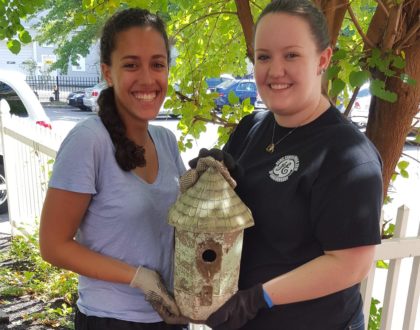Cultivating responsibility in young leaders

‘Responsibility’ is a consistent buzzword in youth development. But what is it, and how do we grow it?
The Preparing Youth to Thrive guidebook defines responsibility as, “dispositions and abilities to reliably meet commitments and fulfill obligations of challenging roles.” Responsibility has been scientifically connected to both academic and professional success. It is a skill and value that young people are expected to have fully absorbed in their adolescence, and carry with them into adulthood.
But in a society rampant with adultism, a concept where we look down on young people and view them as being less capable than their adult peers, it can be challenging for youth to find healthy environments to make decisions, work through mistakes, and celebrate success. Many times, youth are put in situations where adults make decisions on their behalf, with little opportunity for growth and support when it comes to youth making their own decisions. Young people have some opportunities to practice this skill in school, but often with their grades at stake. At InIt, we provide space for our delegates to cultivate their sense of responsibility by requiring that they take on leadership roles and use different resources to meet high expectations for their Community Action Projects (or CAPs).
We help students hone this skill through their CAPs: we create a framework that scaffolds demands and obligations placed on them, we provide them with opportunities that they genuinely care about, and give them choices in what their roles will be, fostering a shared sense of ownership. InIt staff give delegates basic requirements their CAPs must meet to be considered successful (i.e., a certain number of hours it engages attendees throughout the year). Once they are given these parameters, they are able to brainstorm as a group how to translate what they are passionate about to an effective project in their school, and what the group will need to do along the way.

This year, the delegation at The Rivers School is taking responsibility in their CAP and running with it. When the program first starts, InIt staff take the reins of delegation meetings to provide context for the CAPs and expectations of the year. As the weeks go by, delegates take more ownership over who runs the meetings. They decide the flow of work, divide tasks to be completed, and have conversations about what their roles will be during workshops held later in the year.
Because the delegates are incredibly invested in their workshop topics (overcoming ableism, racism, and heterosexism), they’re highly motivated to follow through with their tasks and check in with each other to see if anyone needs additional support. This reflects the delegates’ understanding that they have a responsibility to each other and to the vision of their project to follow through and succeed. One way they were able to demonstrate their Responsibility skills was when the Rivers delegation worked together to submit their project proposal. When end of term exams arrived, the delegates recognized that they’d have to find creative ways to share the work. They decided to tag team writing their proposal, trading off editing responsibilities with whoever didn’t have a test the next morning. They completed it on time.
Staff members are an important part of this process. InIt staff need to give support when delegates need it, but my primary role is knowing when to step back. I’m the lucky staff member that gets to support this delegation. At Rivers, I will never tell the students what the next responsibilities for their project need to be, I always try to just ask them more questions. They know where their passions lie. They know the needs of their school. They know what they want the finish line of their CAP to look like. My job is to be a soundboard as they think through the best path to get there.
Challenges, setbacks, and mistakes are part of the process and will inevitability happen to all the delegations. But each obstacle its own learning opportunity that gives the delegates a chance to trust each other, utilize the resources available to them, and meet the demands of their project. Responsibility is woven into every action the delegates take to complete their project, and the pride they express when their CAPs wrap up at the end of the year is a sight to behold. We have six months of the program left to go, but with the delegates taking responsibility for their projects and making it their own, it’s going to be a wonderful journey.
